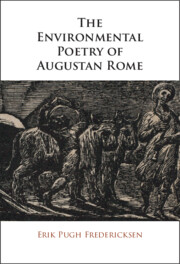Book contents
- The Environmental Poetry of Augustan Rome
- The Environmental Poetry of Augustan Rome
- Copyright page
- Contents
- Acknowledgments
- Editions of Main Texts
- Introduction
- Chapter 1 Local Dwelling and Pastoral Place in Vergil’s Eclogues
- Chapter 2 The Local Environments and More-Than-Human Music of the Eclogues
- Chapter 3 Vergil’s Ecological Poem
- Chapter 4 Poetry of Place and Planet
- Chapter 5 Natures and the Nonhuman in Horace’s Odes
- Chapter 6 Translocal Lyric
- Epilogue
- References
- Index Locorum
- General Index
Chapter 6 - Translocal Lyric
Horace’s Odes and the Poetry of Place
Published online by Cambridge University Press: 12 December 2024
- The Environmental Poetry of Augustan Rome
- The Environmental Poetry of Augustan Rome
- Copyright page
- Contents
- Acknowledgments
- Editions of Main Texts
- Introduction
- Chapter 1 Local Dwelling and Pastoral Place in Vergil’s Eclogues
- Chapter 2 The Local Environments and More-Than-Human Music of the Eclogues
- Chapter 3 Vergil’s Ecological Poem
- Chapter 4 Poetry of Place and Planet
- Chapter 5 Natures and the Nonhuman in Horace’s Odes
- Chapter 6 Translocal Lyric
- Epilogue
- References
- Index Locorum
- General Index
Summary
Chapter 6 reads Horace’s Odes as thoroughly place-based lyric poetry. The chapter begins by differentiating its approach from landscape and symbolic readings of place. It organizes an account of the Odes around the concepts of place and place attachment, familiar from the Eclogues. Horace represents dynamic experiences of specific localities, constituted by human and nonhuman beings. He anchors his poetry to particular locations, while also making those locations real-and-textual sites of Horatian poetry. In addition, Horace represents place as helping to produce and shape his poetry through tropes of lyric ecology and poetic reciprocity. The second half of the chapter complicates this place-based reading of Horace by attending to the pervasive theme of mobility in the Odes. It argues that Horace models a translocal poetics, in which locality is continually fashioned and refashioned through forms of translation and transport. Whereas forced movement in the Eclogues means the end of local dwelling and local song alike, for Horace mobility helps create both his local place attachments and a form of lyric that is place-based but not place-bound.
- Type
- Chapter
- Information
- The Environmental Poetry of Augustan Rome , pp. 228 - 257Publisher: Cambridge University PressPrint publication year: 2024

